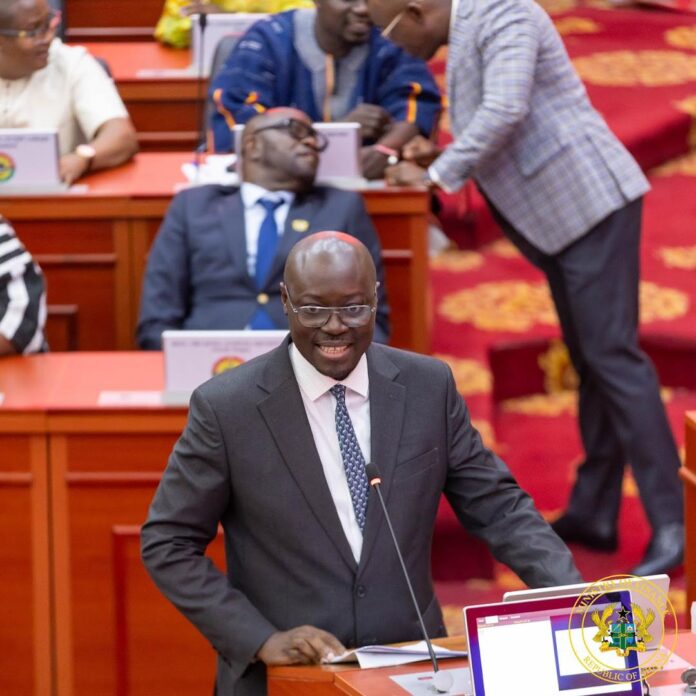The Minister for Finance, Dr. Cassiel Ato Forson, has dismissed assertions that Ghana’s industrial sector slowed because of the realignment of the One District One Factory (1D1F) initiative, stating plainly that data from the Ghana Statistical Service (GSS) proves otherwise.
Speaking during the closing debate of the 2026 Budget, the Minister described comments by Hon. Abena Osei-Asare as “unfounded and analytically weak,” insisting that the facts tell a different story.
According to Dr. Forson, the contraction in the industrial sector during 2025 was driven not by 1D1F adjustments, but by deep structural weaknesses in the petroleum sub-sector inherited from prolonged under-investment.
“The oil and gas sub-sector contracted by 18.1 percent in the first quarter of 2025 and 22.5 percent in the second quarter, averaging 20.1 percent in the first half of 2025,” he revealed. “That single structural shock pulled overall industry growth down to 3.4 percent.”
He explained that the decline was entirely traceable to falling upstream petroleum output and not to government policy shifts, adding that the previous administration’s failure to invest adequately in the sector left the economy vulnerable.
“What happened in oil and gas had nothing to do with 1D1F,” he stressed.
Contrary to claims that the withdrawal of government support under 1D1F weakened manufacturing, the Minister said the opposite occurred. The manufacturing subsector—where most 1D1F firms operate—expanded by 6.3 percent within the same period.
“If a business collapses after government support is withdrawn in just ten months, that business was never viable,” he argued. “Ghana cannot build an industrial future on handholding disguised as industrialisation.”
New Industrial Push Under the 2026 Budget
Dr. Forson maintained that the 2026 Budget expands industrial opportunity rather than constraining it, outlining a fresh wave of industrial policy tools:
- A US$500 million Oil Palm Development Finance Window
- Provision of over 4,000 agricultural machinery units across 50 districts
- New incentives for textiles, agro-processing, pharmaceuticals, and export manufacturing
He said ongoing VAT reforms will reduce distortions, unlock growth, and widen access to input credits—an intervention meant to spur scale, competitiveness, and long-term resilience.
“These are the real levers of industrial expansion,” he said. “The evidence does not support the claim that industrial decline resulted from changes to 1D1F. The data does not support it. And neither does the 2026 Budget.”
Finance Minister Rebuts Claims of Missed Fiscal Targets — “The Data Speaks, and It Disagrees”
The Minister for Finance, Dr. Cassiel Ato Forson, has firmly rejected claims by Hon. Gideon Boako that government missed “at least 50 percent” of its fiscal targets, describing the statement as inaccurate, unsupported, and contradicted by every macro indicator available.
Taking the floor during the closing debate on the 2026 Budget, Dr. Forson said the numbers paint a completely different picture — one of recovery, discipline, and restored confidence in Ghana’s economic management.
“It is a curious claim, because none of the macro data supports it,” he stated.
The Numbers That Refute the Claim
The Finance Minister listed five key indicators to illustrate Ghana’s performance trajectory in 2025:
- Growth hit 6.3 percent in the first half of 2025, far above the 4.0 percent target for the year.
- Inflation dropped sharply from 23.8 percent at the end of 2024 to 8 percent by October 2025 — outperforming the targeted 11.9 percent.
- The primary balance moved from a deficit of 3 percent of GDP to a surplus of 1.6 percent by September 2025 — almost triple the target.
- Public debt fell from 61.8 percent of GDP in 2024 to an estimated 45 percent by end-October 2025 — the strongest correction in more than a decade.
- Gross international reserves increased from four months to 4.8 months of import cover, boosting currency stability and investor confidence.
“These are facts — verified by the markets, recognised by rating agencies, and acknowledged by the IMF and the World Bank,” Dr. Forson emphasised.
“This is not the profile of a government missing half its targets. It is the profile of a government regaining credibility through discipline.”
Growth Projections Defended: “We Choose Evidence Over Wishful Thinking”
Responding to opposition members who described the 4.8 percent growth forecast for 2026 as “illogical,” Dr. Forson insisted the projection was measured, prudent, and grounded in reality — not politics.
“We prefer realism to wishful forecasting,” he said. “Our projections are credible because they are built on evidence, not bravado.”
He further addressed claims by Hon. Dr. Mohammed Amin Adam that the budget is “growthless” and “jobless,” describing the suggestion as detached from policy reality.
Inflation Is Falling for a Reason — And Policy Is Behind It
The Minister argued that Ghana’s disinflation is neither accidental nor cosmetic — it is the outcome of targeted supply-side interventions, especially in food production.
Government, he outlined, is rolling out:
- Feed Ghana input expansion and vegetable value-chain support
- Over 10,000 hectares of new irrigation coverage
- More than 4,000 mechanisation units through Farmer Service Centres
These are backed by 1,000 km of agricultural enclave roads, GH¢200 million for buffer stock operations, warehousing support, aquaculture facilities, and expanded market logistics to cut food transportation costs.
“This is what it means to let the data shape policy,” he stated.
A Budget That Creates Jobs — Not One Without Them
Contrary to opposition claims that the Budget holds no employment promise, the Minister highlighted that GH¢74 billion in government programmes is expected to generate approximately 800,000 jobs nationwide.
“The idea that a GH¢74 billion jobs engine is somehow ‘jobless’ is simply untenable,” he declared.
The Record, As He Says, Is Clear
With growth stabilising, inflation falling, debt receding, and reserves strengthening, Dr. Forson said the numbers now tell a single compelling story — Ghana is rebuilding credibility through discipline, data, and deliberate policy choices.
“The facts disagree with the narrative,” he concluded. “And Ghana deserves a debate anchored in evidence — not assumption.”


